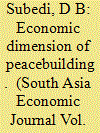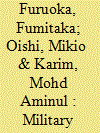| Srl | Item |
| 1 |
ID:
120083


|
|
|
|
|
| Publication |
2012.
|
| Summary/Abstract |
This article studies economic dimension of peacebuilding, concentrating on post-conflict economic recovery and development (PCERD) in Nepal. The current peace process in Nepal has a historical opportunity to address economic root causes of the armed conflict and lay a foundation for inclusive economic development. However, the economic dimension of peacebuilding has been sidelined by the contentious transitional politics in the Nepali peace process. Taking a maximalist approach to development, this article argues that PCERD in Nepal should be understood as a multiple-faceted long-term process which might incorporate both short-term and long-term priorities. While the short-term priority should target at delivering the economic dividends of peace in the immediate aftermath of the conflict, the long-term priority should be geared towards addressing the economic root causes of the preceding armed conflict as well as laying the foundation for an inclusive economic development. It should be accomplished by taking into account a wider range of the social, economic, political, psychosocial, and security related needs and aspirations of the conflict-affected people as well as the wider populace. Making an analysis from a political economy perspective, this article also discusses potential barriers to PCERD and finds that lack of commitment by the key political actors to engage in policy debates and discussions around economic recovery and development and dwindling post-conflict public security are the barriers to economic recovery and development in post-conflict Nepal.
|
|
|
|
|
|
|
|
|
|
|
|
|
|
|
|
| 2 |
ID:
143604


|
|
|
|
|
| Summary/Abstract |
Increases in military spending have a big impact on the socioeconomic conditions in any country. However, there is no consensus as to whether the rising military expenditure is beneficial or detrimental to economic growth. The present study chose China as a case study to empirically examine a complex relationship between military expenditure and economic development. The findings from the Johansen cointegration test indicated that there existed a long-run relationship between China’s military spending and economic growth. Furthermore, the Granger causality test detected a unidirectional causality from economic development to military expenditure. These results were further confirmed by the findings from the impulse response function. This means that China represents an example of a developing economy where the size of military expenditure expands in the process of economic transformation.
|
|
|
|
|
|
|
|
|
|
|
|
|
|
|
|